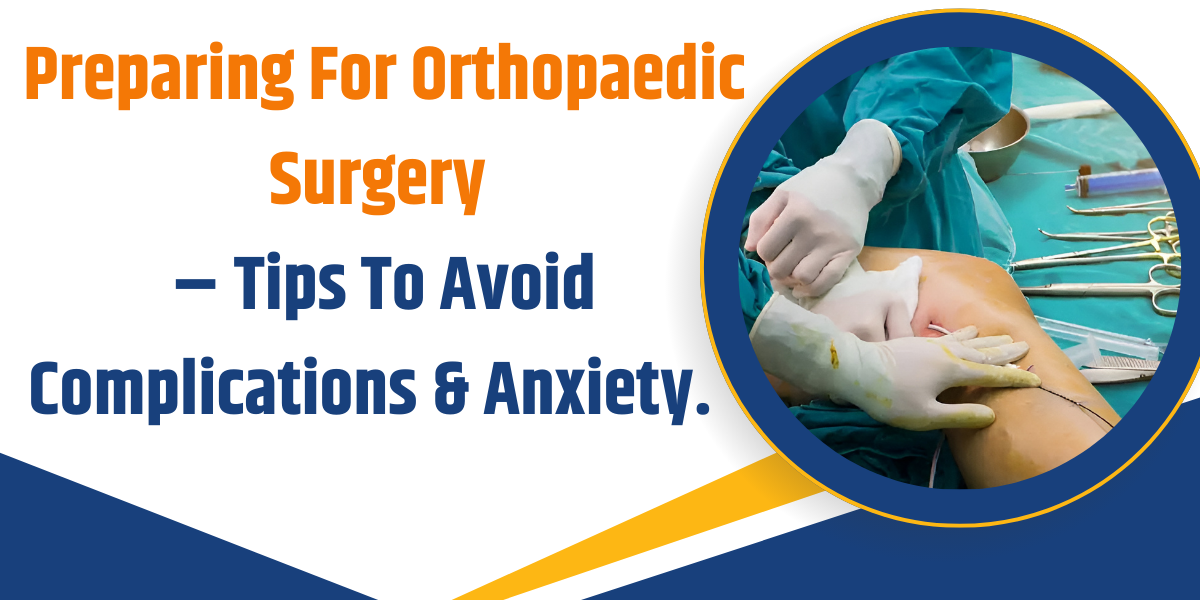Preparing for Orthopedic Surgery: Tips to Avoid Complications & Anxiety.
Orthopedic surgery can be a significant event in your life. Proper preparation is crucial to minimizing complications and reducing anxiety. Dr. Parimal Kore, a leading orthopedic specialist in Magarpatta, provides essential tips to help you navigate the days leading up to your surgery with confidence and ease.
What Not to Do Before Orthopedic Surgery?
Preparation isn’t just about what you should do, but also what you should avoid. Here are some important considerations:
Avoid Certain Medications: Some over-the-counter drugs, particularly aspirin, ibuprofen, and other NSAIDs, can increase bleeding risks. Discuss all your medications, including supplements, with your surgeon to know which ones to stop.
No Alcohol or Smoking: Alcohol can interfere with anesthesia and your body’s healing process. Smoking can impair blood flow and oxygenation, leading to slower recovery. Avoid both for at least a week before surgery.
Skip Heavy Meals: Avoid heavy, greasy meals the night before surgery. This can cause nausea when combined with anesthesia. Opt for a light, easily digestible meal instead.
How to Prevent Orthopaedic Surgery Complications
Preventing complications is a top priority. Here’s how you can help ensure a smooth surgery and recovery with Dr. Parimal Kore:
Follow Pre-Surgery Instructions: Your orthopedic specialist in Magarpatta will provide specific instructions regarding diet, medication, and activity. Adhere strictly to these guidelines.
Maintain Good Hygiene: Bathe with an antibacterial soap before surgery to reduce the risk of infection. Some surgeons may recommend a specific cleansing routine.
Arrange for Post-Surgery Care: Plan for someone to assist you during your recovery. Having support can prevent accidents and ensure you’re following your post-op care plan correctly.
What Is Best to Eat Before Surgery?
Your diet in the days leading up to surgery can influence your recovery:
Focus on Nutrient-Rich Foods: Consume foods high in vitamins, minerals, and proteins, such as fruits, vegetables, lean meats, and whole grains. These nutrients support healing and immune function.
Stay Hydrated: Proper hydration is essential for recovery. Drink plenty of water up until the time you’re instructed to fast before surgery.
Avoid Heavy Foods: As mentioned earlier, avoid greasy or rich foods that could upset your stomach. Stick to light, easily digestible foods the day before surgery.
What Do Doctors Do to You Before Orthopedic Surgery?
Before the surgery, several procedures and checks are typically performed:
Preoperative Assessment: You’ll undergo a physical exam, blood tests, and possibly imaging studies to ensure you’re fit for surgery.
Anesthesia Consultation: An anesthesiologist will review your medical history and discuss the type of anesthesia that will be used during your surgery.
Consent and Final Instructions: You’ll be asked to sign a consent form after your doctor explains the procedure, risks, and expected outcomes. You’ll also receive final instructions on when to stop eating and drinking before surgery.
How Do You Physically Prepare for Orthopaedic Surgery?
Physical preparation is key to a smoother surgery and a quicker recovery:
Exercise Regularly: If your condition allows, maintain a regular exercise routine to keep your body strong. Focus on exercises that improve flexibility, strength, and endurance.
Practice Breathing Exercises: These can help manage anxiety and improve lung function, which is crucial during and after surgery.
Prepare Your Home: Set up your living space for easy navigation post-surgery. Arrange for a comfortable resting area with all necessities within reach.
What Should I Avoid 7 Days Before Orthopaedic Surgery?
In the week before your surgery, avoid:
Blood-Thinning Medications: As mentioned earlier, avoid aspirin, ibuprofen, and similar medications unless your doctor says otherwise.
New Skincare Products: Avoid trying new lotions, creams, or any product that could cause skin irritation or an allergic reaction.
Strenuous Activities: Avoid any activity that could result in an injury or strain. It’s best to focus on light, gentle exercises.
What Is the Psychological Preparation Before Orthopaedic Surgery?
Mental and emotional preparation is just as important as physical preparation:
Educate Yourself: Understand the surgery process, risks, and recovery timeline. Knowledge can help reduce fear and anxiety.
Practice Relaxation Techniques: Techniques such as meditation, deep breathing, or guided imagery can help calm your mind.
Communicate Concerns: Talk openly with your surgeon about any fears or concerns you have. Having your questions answered can greatly reduce anxiety.
Plan for Recovery: Knowing what to expect post-surgery can ease anxiety. Arrange for help, plan for meals, and set realistic expectations for your recovery timeline.
Preparing for orthopedic surgery with Dr. Parimal Kore involves a mix of physical, dietary, and psychological preparation. By avoiding certain habits, following your doctor’s instructions, and preparing your body and mind, you can help reduce the risk of complications and approach your surgery with confidence. Remember, thorough preparation is your best ally for a smooth surgery and a quick recovery.





